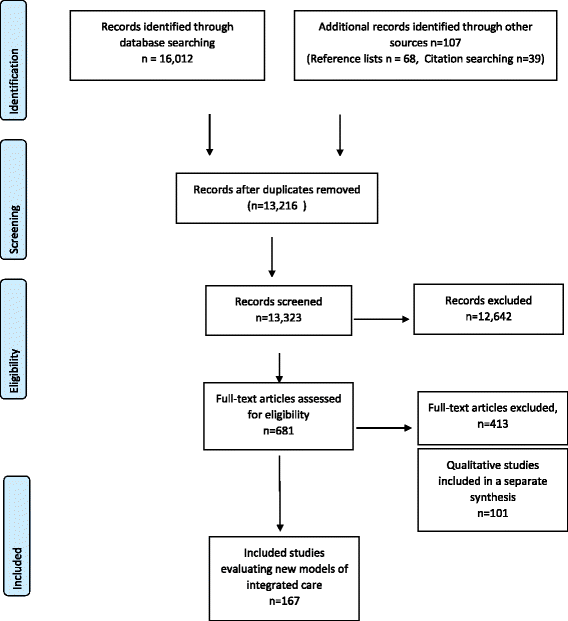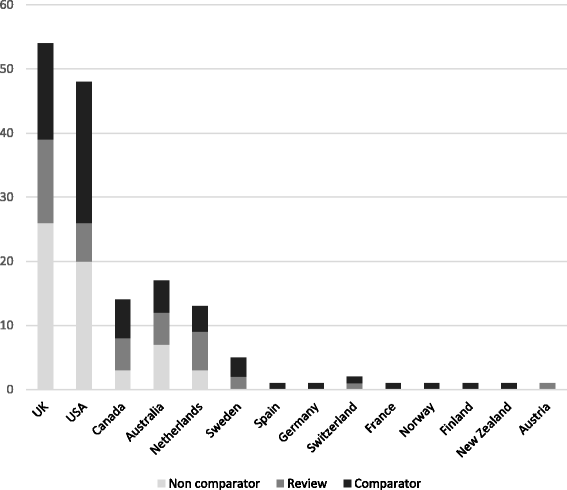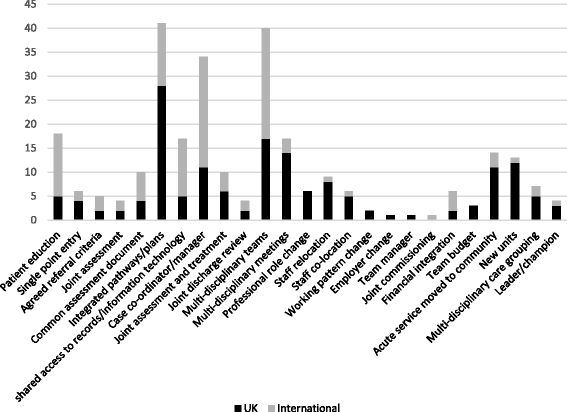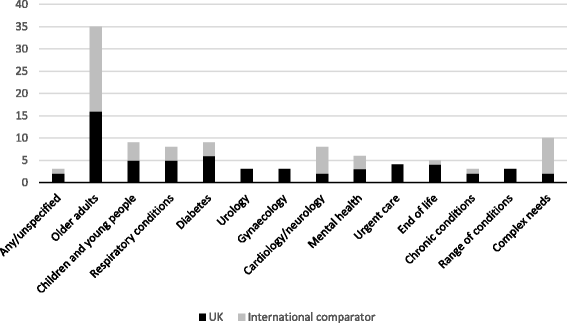The effects of integrated care: a systematic review of UK and international evidence
- PMID: 29747651
- PMCID: PMC5946491
- DOI: 10.1186/s12913-018-3161-3
The effects of integrated care: a systematic review of UK and international evidence
Abstract
Background: Healthcare systems around the world have been responding to the demand for better integrated models of service delivery. However, there is a need for further clarity regarding the effects of these new models of integration, and exploration regarding whether models introduced in other care systems may achieve similar outcomes in a UK national health service context.
Methods: The study aimed to carry out a systematic review of the effects of integration or co-ordination between healthcare services, or between health and social care on service delivery outcomes including effectiveness, efficiency and quality of care. Electronic databases including MEDLINE; Embase; PsycINFO; CINAHL; Science and Social Science Citation Indices; and the Cochrane Library were searched for relevant literature published between 2006 to March 2017. Online sources were searched for UK grey literature, and citation searching, and manual reference list screening were also carried out. Quantitative primary studies and systematic reviews, reporting actual or perceived effects on service delivery following the introduction of models of integration or co-ordination, in healthcare or health and social care settings in developed countries were eligible for inclusion. Strength of evidence for each outcome reported was analysed and synthesised using a four point comparative rating system of stronger, weaker, inconsistent or limited evidence.
Results: One hundred sixty seven studies were eligible for inclusion. Analysis indicated evidence of perceived improved quality of care, evidence of increased patient satisfaction, and evidence of improved access to care. Evidence was rated as either inconsistent or limited regarding all other outcomes reported, including system-wide impacts on primary care, secondary care, and health care costs. There were limited differences between outcomes reported by UK and international studies, and overall the literature had a limited consideration of effects on service users.
Conclusions: Models of integrated care may enhance patient satisfaction, increase perceived quality of care, and enable access to services, although the evidence for other outcomes including service costs remains unclear. Indications of improved access may have important implications for services struggling to cope with increasing demand.
Trial registration: Prospero registration number: 42016037725 .
Keywords: Integrated care; Service reconfiguration, service delivery; Systematic review.
Conflict of interest statement
Ethics approval and consent to participate
Not required.
Consent for publication
The manuscript contains no individual person’s data.
Competing interests
The authors declare that they have no competing interests.
Publisher’s Note
Springer Nature remains neutral with regard to jurisdictional claims in published maps and institutional affiliations.
Figures
References
-
- England NHS. Five year forward view. London: National Health Service England; 2014.
-
- Shortell SM, Addicott R, Walsh N, Ham C. The NHS five year forward view: lessons from the United States in developing new care models. BMJ. 2015;350:h2005. 10.1136/bmj.h2005. - PubMed
-
- Ham C, Murray R. Implementing the NHS five year forward view: aligning policies with the plan. London: Kings Fund; 2015.
-
- Ahmed F, Mays N, Ahmed N, Bisognano M, Gottlieb G. Can the accountable care organization model facilitate integrated care in England? J Health Serv Res Policy. 2015;20:261–264. - PubMed
-
- Robertson H. Integration of health and social care: a review of literature and models implications for Scotland. Royal College of Nursing: Edinburgh; 2011.
Publication types
MeSH terms
Grants and funding
LinkOut - more resources
Full Text Sources
Other Literature Sources
Medical





